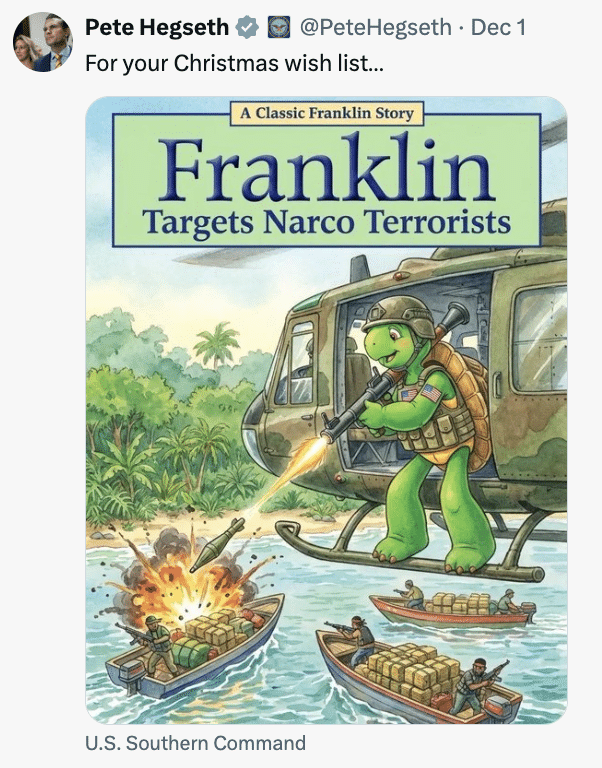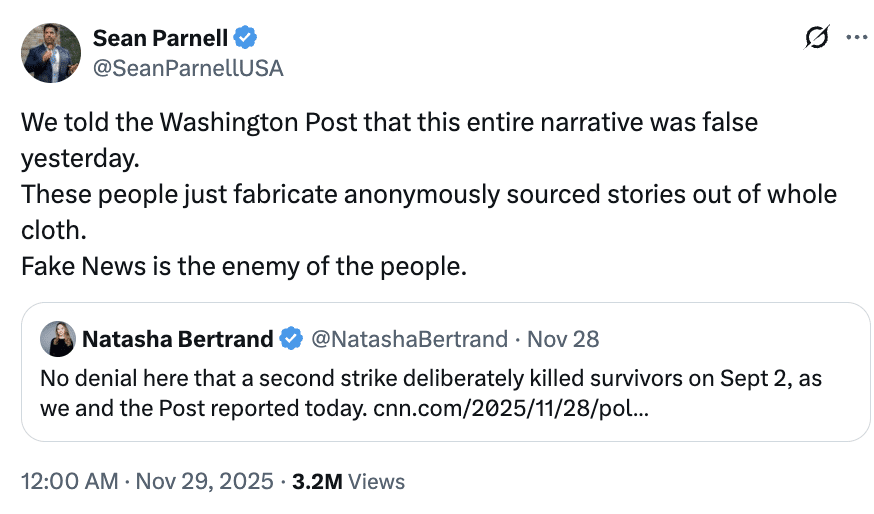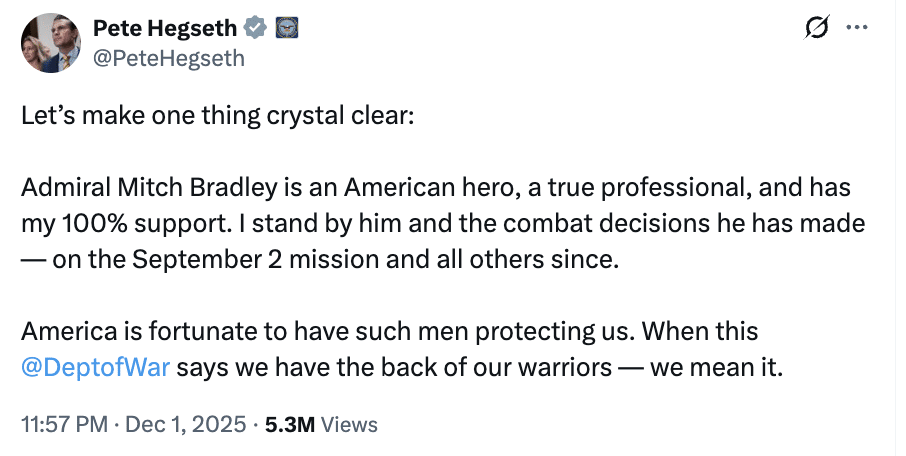On Eve of Illegal Venezuelan Invasion, Pete Hegseth Utterly Destroys His Ability to Lead It
I think the trajectory of the last few weeks has been lost in the serial disclosures, so I want to summarize them here.
Mark Kelly and five other Democrats made a video reminding service members they can refuse illegal orders
On November 18, Elissa Slotkin released a video in which she and five other former military or intelligence officers — Mark Kelly, Chris DeLuzio, Maggie Goodlander, Chrissy Houlahan, and Jason Crow — reminding that they can refuse illegal orders.
One of the tactics Republicans chose to use in response was to demand that the members of Congress describe what illegal orders had been given.
An even stupider tactic was to move to prosecute the six, in Kelly’s case (because his retirement makes him susceptible to such a thing), threatening to withdrawn him from retirement to courtmartial him.
Trump and Pete Hegseth chose to give Kelly, a genuine hero, likely presidential candidate, and far more of a man than either of them, a bigger platform and fundraising draw.
WaPo publishes the first double tap story
The video from the six Democrats was likely focused on orders to target Americans, not Venezuelans (or Colombians or Trinis, all of whom have been targeted in the murderboat strikes); it specifically describes that the Trump Administration is pitting the military and intelligence community against American citizens.
But then WaPo described Pete Hegseth — verbally — giving the quintessential illegal order.
The longer the U.S. surveillance aircraft followed the boat, the more confident intelligence analysts watching from command centers became that the 11 people on board were ferrying drugs.
Defense Secretary Pete Hegseth gave a spoken directive, according to two people with direct knowledge of the operation. “The order was to kill everybody,” one of them said.
A missile screamed off the Trinidad coast, striking the vessel and igniting a blaze from bow to stern. For minutes, commanders watched the boat burning on a live drone feed. As the smoke cleared, they got a jolt: Two survivors were clinging to the smoldering wreck.
The Special Operations commander overseeing the Sept. 2 attack — the opening salvo in the Trump administration’s war on suspected drug traffickers in the Western Hemisphere — ordered a second strike to comply with Hegseth’s instructions, two people familiar with the matter said. The two men were blown apart in the water.
The initial response to this was the same tactic that has gotten Trump where he is: to attack the press, claiming it was fake.
Trump promises to pardon Juan Orlando Hernández, destroying pretext for war
Meanwhile, Trump totally undercut the premise behind over a year of targeting Venezuela.
There were always problems with Trump’s pretense for the murderboats and planned Venezuelan invasion, which is that Venezuela’s government leads a cartel of narcotraffickers that amounts to an invasion of the United States.
At first, Stephen Miller’s bullshit about Venezuela was rooted in false claims about Tren de Aragua. Perhaps because the Intelligence Community publicly debunked those claims (but not before Miller relied on his bullshit to send 200 mostly-innocent men to a concentration camp, where they were tortured), Miller moved onto a new predicate. Nicolás Maduro wasn’t in charge of Tren de Aragua, Miller decided; he was in charge of Cartel de los Soles.
Tren de Aragua at least exists, albeit not in anywhere near the numbers of slumlord residents as Miller has claimed. It’s not at all clear CdlS does. Plus, if it does exist, it traffics in cocaine, not fentanyl, the claimed invading drug that justifies treating drug trafficking as war (almost no right wing Senators understand this problem, which would be hilarious if it weren’t about to become the new Yellowcake).
But then Trump promised to pardon former Honduran President Juan Orlando Hernández, who actually did what Trump claims Maduro is doing, who was convicted of it, who was sentenced to decades in prison.
You cannot credibly claim to give a fuck about drug trafficking when you’re freeing major traffickers. I mean, Trump doesn’t care, but the men and women risk their lives and their liberty have to attend to the likelihood they’ll be left holding the bag for Trump’s crimes.
White House concedes the double tap but defends Hegseth
Then, as Congress — led by Senate Armed Services Committee Chair Roger Wicker — begins to investigate the operation, demanding the full video of the strike and testimony from those involved, and as legal experts made it clear that this was not just a war crime, but murder, the White House changed tack. Trump knew nothing, wouldn’t have wanted it to happen, but in fact it did happen but Pete Hegseth didn’t give the order.
While NYT was publishing a story laundering Hegseth’s claims (that he did not specifically order the murder), WaPo was back with quotes from service members recognizing that Hegseth had begun underbussing his subordinates, especially Admiral Frank Bradley.
“This is ‘protect Pete’ bulls—,” one military official, who, like others, spoke on the condition of anonymity to discuss internal conversations, told The Post.
Leavitt’s statement “left it up to interpretation” who was responsible for the second strike that killed the two survivors, a separate military official said, imploring the White House to provide clarity on the issue.
One official said of Leavitt’s statement, “It’s throwing us, the service members, under the bus.” Another person said some of Hegseth’s top civilian staff appeared deeply alarmed about the revelations and were contemplating whether to leave the administration.
Hegseth, writing on social media Monday night, said he stands by the admiral “and the combat decisions he has made — on the September 2 mission and all others since.” His statement is likely to deepen the sense of furor among military officials who suspect Hegseth is attempting to insulate himself from any legal recourse and leave Bradley — whom the secretary called “an American hero, a true professional” — to account for the fallout alone.
Whiskey Pete even posted a tweet claiming to have Bradley’s back while emphasizing that Bradley made the decision.
CIA’s disavowal of Rahmanullah Lakanwal
This comes amid several reports that Rahmanullah Lakanwal, the accused killer of two National Guard members last week, had done terrible things for the CIA, but then was abandoned by John Ratcliffe’s CIA before declining into bouts of depression in advance of the attack.
The struggles to start over, leave the war behind, and find work were ever present. Lakanwal was fired from his job at a laundromat because he lacked a work authorization card despite being approved for asylum and authorized to work by the Trump administration, according to his former unit mate, who fought alongside him for more than a decade.
[snip]
About a month ago, Lakanwal told his unit mate that his inability to work due to missing immigration paperwork meant his family couldn’t afford rent or food. He resorted to borrowing money from friends and former unit members, and during the conversation, he broke down in tears from frustration and desperation, his unit mate said.
“Every time, like looking [for] somebody [to] help for documents, somebody [to] help for pay the rent, he’s not going to work,” the Afghan unit mate said.
His unit mate said Lakanwal sought help in June from a CIA program designed to aid Zero Unit veterans with immigration issues. Rolling Stone reviewed a screenshot of the group chat in June where Zero Unit veterans shared information with a CIA representative about ongoing issues. Lakanwal posted messages asking for help. His last post went unanswered and was deleted by the chat’s administrator.
None of this excuses the killing. It just makes clear that Lakanwal is one of thousands of men damaged by America’s war on terror who needs — in this case, needed — help before something terrible happens. Nigel Edge, the former Marine sniper who shot up a club from his boat in Cape Fear in September, is another one.
Mark Kelly models leadership
Meanwhile, precisely because Trump and Hegseth chose to attack Kelly, he was able to stage a press conference for little other reason than to attack Trump and Hegseth’s leadership failures.
That included addressing the double tap, in which he mostly deferred to investigations, but still upheld the import of international law.
We don’t know how all this will end.
What we do know is that, in advance of a likely demand that service members do something patently illegal, Pete Hegseth has made it clear he’ll sacrifice everyone to save himself.




